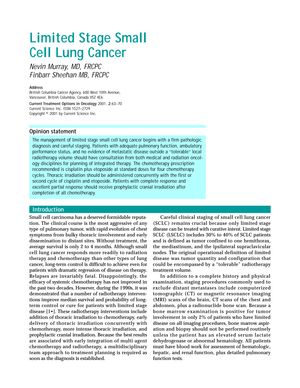Limited Stage Small Cell Lung Cancer: Treatment Strategies and Prognostic Factors
January 2001
in “
Current Treatment Options in Oncology
”

TLDR Treat limited stage small cell lung cancer with chemotherapy and radiation, and consider preventive brain radiation for better survival chances.
The document from 2001 outlines the treatment strategies for limited stage small cell lung cancer (LSCLC), recommending a multidisciplinary approach that includes chemotherapy, specifically cisplatin and etoposide for four cycles, and concurrent thoracic irradiation. Prophylactic cranial irradiation (PCI) is advised for patients with complete or excellent partial responses to reduce the risk of death and improve overall survival. The median survival with integrated chemoradiation is 18 to 24 months, with 20% to 25% of patients becoming long-term survivors. Twice-daily radiotherapy has shown improved survival rates over once-daily treatments. The document also notes the importance of good performance status, female gender, and normal lactate dehydrogenase levels as prognostic factors for prolonged survival. Surgery may be considered for a small number of patients, and long-term follow-up is necessary to monitor for intellectual decline from PCI and the risk of a second primary lung cancer. The cost-effectiveness of treating LSCLC is estimated at $12,000 per life year gained. Specific study results cited in the document are not detailed in the summary.